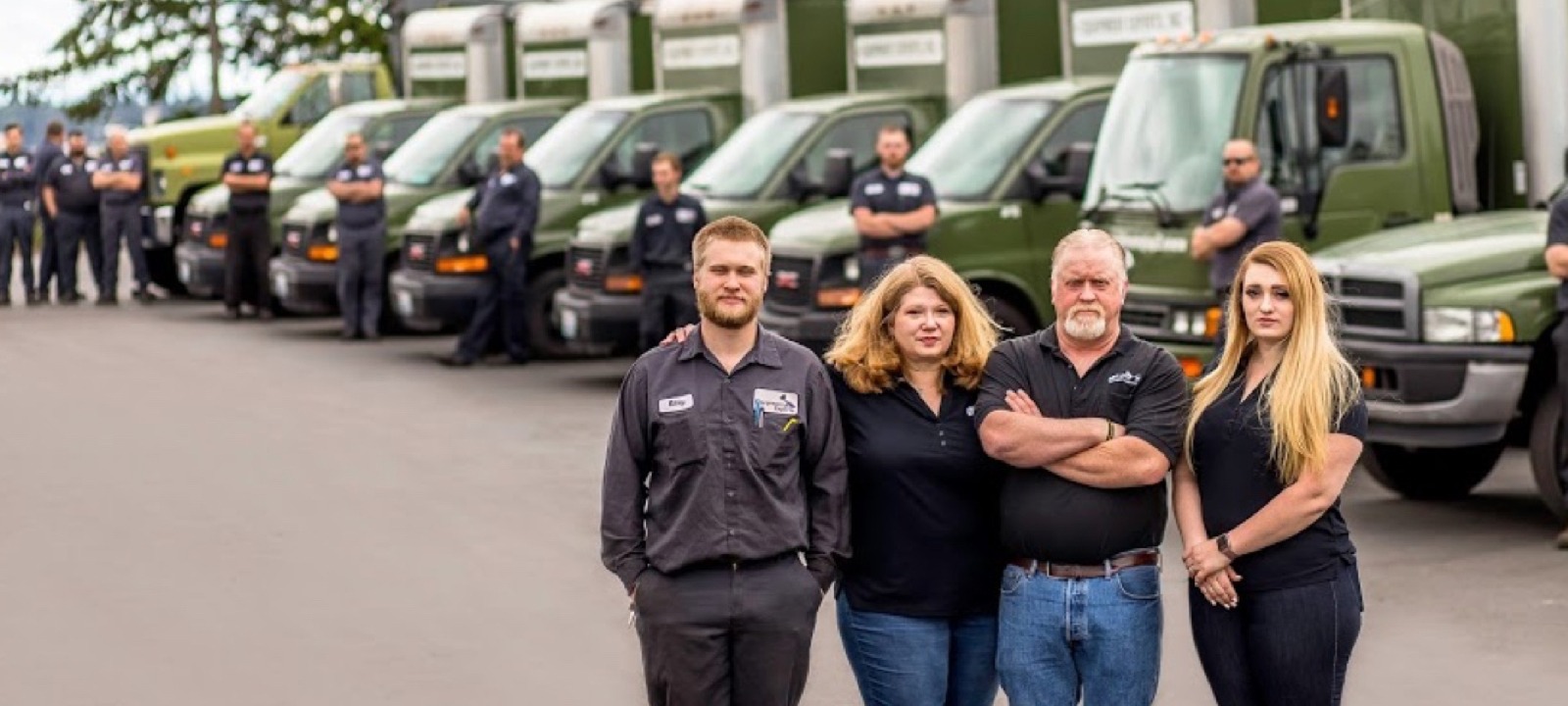Shop Stories: Equipment Experts

A long time ago, in a state far, far away…
Okay, so maybe it wasn’t that long ago—early 2000s—and it wasn’t a state that far away, but rather, um, Washington, which could be far away if you’re reading this from, say, Florida.
If you’re a Fullbay regular, you probably know Stacy and Greg Conner of Equipment Experts, Inc.—they’ve appeared at Diesel Connect, on several webinars, and Stacy has frequently appeared on this very blog to provide advice on shop marketing, business operations, and more. We knew we were long overdue to hear their origin story, so we sat down virtually with Stacy to learn more about Equipment Experts’ roots, where they are, and where they hope to go.
THE KINGDOME AND AN INTERNATIONAL
The story of Equipment Experts, Stacy said, really began with her husband Greg.
Greg caught the wrenching bug early; his father was a mechanic, and by 16 Greg was a mobile tech. He was emancipated by his senior year, and went to school for a few hours a day while working nights.
The story of Equipment Experts, though, really begins with the dearly departed Kingdome, a Seattle stadium. At the time, Greg was working two 40-hour/week jobs: “He would work from 6 AM to 2 PM, and then from 4 to midnight maintaining the equipment at the Kingdome,” Stacy told us. The stadium was in the process of being demolished.
Greg got into the union. All seemed well. Then during a night shift someone dropped a piece of concrete on his foot.
OW.
Stacy was at home with two children and pregnant with her third when she got that phone call.
“He had to get foot surgery, and two days later I delivered a baby,” she said. “Both of us are sitting on the couch, and we can’t move, and we’ve got a newborn, and luckily the two older kids could bring us the remote. We watched all the seasons of Law & Order.”
It took Greg six weeks to heal up. He headed back to work…
…and got laid off.
Yep. First day back on the job.
Say it again! OW.
Greg went back to Stacy. “The only way to do this is for me to go out on my own,” he said.
Greg bought a 1991 International that he parked in their driveway. He then spent six months building that International out into a service truck.
“That’s how the whole thing started,” Stacy said. “He had no intention of starting his own business or anything…he was just trying to feed his family.
“This is why he’s my hero.”
SLOW AND STEADY GROWTH
For three years, Greg cruised the highways of Washington, performing maintenance and repairs for those who needed him. Lone wolf techs can identify with his efforts: Doing the work, buying the parts, writing up invoices, and searching for customers—all on his own.
Stacy had a corporate job at the time, and was wrangling her two older children, a newborn, and the household. “It was too much,” she said. She left her digital marketing role and began working part-time with Greg in 2008.
Over time, they hired technicians, a service manager, and a finance person. The business was growing, but there was one small problem. Well, two, really: “Greg was a mechanic with zero managerial skill, and I came into this as a marketing and sales person with virtually zero managerial skill.”
They’d never managed anyone. They’d never had control of a department or a division.
Now they were suddenly running and growing a business.
“We learned through mistakes,” she said. “It’s gonna be 15 years from 2008 forward, and it started in 2005…so what we’ve built has been a university of hard knocks.”
HOW TO GROW A REPAIR SHOP
For Stacy and Greg, the keys to their success—and growing Equipment Experts from one truck to several trucks and a large facility—have been humbleness and curiosity. They looked for the same traits in their employees.
And why not? There’s always more to learn!
“Every person here wants to learn and do better,” she said. “To do that, you keep incorporating it.”
That means not giving up when problems arrive or persist. That means being willing to try new things, even if they seem a little unconventional. That’s especially important today, with all kinds of new technology and alternative fuels hovering over the horizon.
“WHAT ADVICE WOULD YOU OFFER TO NEW SHOP OWNERS?”
We asked Stacy what wisdom she’d pass on to those just starting out (or even those who have been around for a while). “Take advantage of the resources out there,” she said. “Before you start, understand what sales tax is and how to use it. Gain some skill in managing other people.”
There are hundreds of thousands of small businesses out there. Some two-thirds of them never grow beyond one person. Sure, some of them are sole proprietors in general, but some of them don’t grow because their owners never learn how to manage others.
Other businesses, she added, never grow beyond, say, a dozen people because they never learn how to build the kind of systems to maintain that growth.
“There’s a lot of education and knowledge on how to actually run a business and make it perform out there,” she said. “When you start, you just think you’re good at a thing. You don’t realize there’s a whole other thing you gotta get good at.”
Sitting at the top of an organization is very, very different from sitting in the middle or the bottom (which is where a lot of us spend most of our working lives). When you’re at the top, Stacy said, you can see everything that’s going on. Techs who open their own shops often run into this problem: they’ve seen the view from the bottom, but not the top. They go from being an expert in wrenching to needing to be an expert in finances, HR, and insurance.
Stacy and Greg might not have had a strong background in running businesses, but they recognized that lack of foundation. They invested heavily in education wherever they could. “The more you educate yourself, you save yourself those ‘walking-into-walls’ situations,” She explained.
“WE KNEW WE MADE IT WHEN…”
We like to ask the people we talk to if they’ve had an A-Ha! Moment—a sudden realization that “Dang, we’re doing well at this whole diesel thing.” (There isn’t always just one A-Ha! Moment, by the way—some shop owners have them regularly!)
For Equipment Experts, one such moment came earlier this year. Work was coming in briskly, to the point where they were having trouble hiring enough techs to keep up with the work. Then…things slowed down. The economy decided it wanted to knock back a few beers and chill rather than churn along like it had been.
For many, an economic slowdown can inspire a sense of dread. The Equipment Experts crew acknowledged that they might have to maneuver around instead of cruising on Easy Street, but they knew they could maneuver. And by maneuver, we mean selling themselves—revving up their marketing engine.
It may not seem like a big deal, but knowing you’ll be okay when things are slowing down is a huge weight off…well, everyone—both mentally and emotionally. If Stacy and Greg are confident that things are going to turn around, their employees can be confident, too (and feel secure in their jobs).
“We’re a tiny organization in the scope of the Puget Sound region that has an opportunity to get market share in a downtime,” she said.
ONWARD & UPWARD
The Equipment Experts crew intends to keep growing. They’re aiming to expand into two additional hubs (not shops) over the course of the next year. “We’ll always be expanding, and we have a second generation interested in our company, so we have a push from the youngers,” Stacy said, referring to her kids. “We’re not gonna sit here and harvest and retire.”
She knows it won’t necessarily be easy. Heck, at times it may be downright difficult. But the hard work makes it so worth it—as does the joy of passing on to the kids something they’ve built together as a family.

